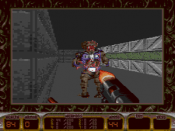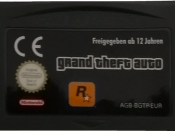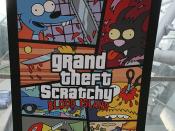Saleable Rock Star Games Every time I visit my uncle's, not surprisingly, I am sure all my cousins are sitting in the front of the television or computer and playing games excitedly. Some of these games--in which players earn points by carjacking taxis, scoring drugs from cursing thugs, and mowing down pedestrians "" are sick stuff. As one of the well-designed advertisement placing on the website, it says, "Grand Theft Auto is a sprawling epic which will show you that sometimes crime can pay and sometimes it can pay you back" (Grand Theft Auto ). In fact, Grand Theft auto is notorious for its graphic, gruesome and grotesque. It has a way of pissing people off. But sadly, those games are saleable. Why exactly? It's certainly not gorgeous illustrations, challenging gameplay, and nuanced story lines that entice kids to buy them. For example, Grand Theft Auto is joined by the splatter-fests Postal, Duke Nukem 3D and Carmageddon.
Postal and Carmageddon's graphics resemble the art scribbled on notebooks by that scary stoner guy in high school. (So that's what he did when he grew up.) Their gameplay, essentially gunning down/driving over anything that moves, is no great invention either. In Postal, players control the crazy "Postal Dude" whose task is to fire on all targets -- parishioners leaving church or the high school band. "Only my gun understands me," he says at one point. Grand Theft Auto at least displays some wit; every car that you steal has its radio tuned to a different radio station, and the player variously hears country and western, rock and classical. But cleverness, whatever meager amount there is, has little or nothing to do with their success.
Gamers seek out provocative content. Judging by the game boxes, the main selling points of games are often severed heads, sadistic weapons, and leering demons. The cartoonish tag lines, "As easy as killing babies with axes" and "More fun than shooting your neighbor's cats", could hardly get any more sensational and attention-getting. Even a smart, nuanced game like Activision's Tenchu (an elegantly designed game set in Medieval Japan where the user is rewarded for their patience, strategic skills and stealth) depicts victims dying in gushing fountains of blood. For many, "toxic culture" in the game world must seep into the real one and recent press reports continue to mix the provocation with actual impact. Postal, in fact, was singled out by CNN News as a game that may inspire crimes like that of Kip Kinkel, the 15 year-old who opened fire in his high school cafeteria, killing two of his classmates. Even with the massacre in Littleton, Colorado The New York Times singled out Eric Harris' passion for Doom and Quake as one of the potential causes for his psychopathic rampage. ("æ) No doubt, over-the-top game violence is also an obvious economic strategy to survive in a crowded market for games; since videogame sex is still in the second (at least as far as we know), the next best controversy available is graphic content. Postal and Carmaggedon is not only easy but profoundly ahistorical. The attraction to artistic gore and horror is not new. In fact, this morbid fascination has existed and flourished -- often producing outstanding works of art -- for thousands of years. Lycaon, a character in Ovid's "Metamorphoses," turns his victims into pies that he then ingests. Goya's political grotesques depicted the god Saturn bloodily devouring his own children ,perhaps serving as an influence for GT Interactive 's Doom: Thy Flesh Consumed.
People start to pay attention on these saleable games phenomenon, which result in social problem. The Sony Playstation games with violence and horror are banned from store shelves in Brazil. A parents group in France and officials in Britain condemned Grand Theft Auto. In our country, Connecticut senator Joseph Lieberman pressured the videogame industry to adopt a ratings system for explicit gore and sexuality in games. But the most pressing argument by the videogame industry against the prohibition and ratings system is that violence and horror are at the heart of kids culture, precisely where no parents are bothering to look: in children's fables.







